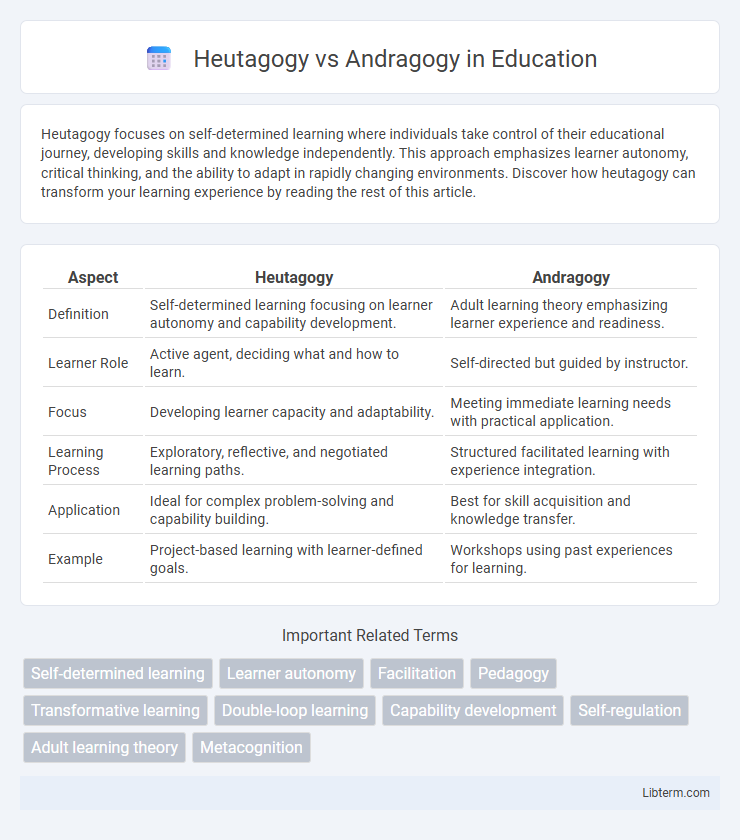Heutagogy focuses on self-determined learning where individuals take control of their educational journey, developing skills and knowledge independently. This approach emphasizes learner autonomy, critical thinking, and the ability to adapt in rapidly changing environments. Discover how heutagogy can transform your learning experience by reading the rest of this article.
Table of Comparison
| Aspect | Heutagogy | Andragogy |
|---|---|---|
| Definition | Self-determined learning focusing on learner autonomy and capability development. | Adult learning theory emphasizing learner experience and readiness. |
| Learner Role | Active agent, deciding what and how to learn. | Self-directed but guided by instructor. |
| Focus | Developing learner capacity and adaptability. | Meeting immediate learning needs with practical application. |
| Learning Process | Exploratory, reflective, and negotiated learning paths. | Structured facilitated learning with experience integration. |
| Application | Ideal for complex problem-solving and capability building. | Best for skill acquisition and knowledge transfer. |
| Example | Project-based learning with learner-defined goals. | Workshops using past experiences for learning. |
Understanding Heutagogy and Andragogy
Heutagogy emphasizes self-determined learning where learners drive their educational journey, fostering critical thinking and capability development. Andragogy focuses on adult learning principles, leveraging learners' experiences and readiness to learn in goal-oriented contexts. Understanding these approaches enhances tailored educational strategies, promoting autonomy in Heutagogy and practical application in Andragogy.
Historical Origins of Adult Learning Theories
Heutagogy emerged from the evolving concepts of self-determined learning, initially conceptualized by Stewart Hase and Chris Kenyon in the early 2000s, emphasizing learner autonomy and capability development. Andragogy, introduced by Malcolm Knowles in the 1960s, challenged traditional pedagogy by identifying specific characteristics of adult learners, such as the need for practical, experience-based education and self-direction. Both theories trace their roots to early educational psychology but address adult learning through different paradigms: andragogy focusing on structured facilitation while heutagogy prioritizes self-directed learning and adaptability in complex environments.
Core Principles of Andragogy
Andragogy centers on self-directed learning, emphasizing the learner's prior experiences as a foundation for new knowledge acquisition. It recognizes adults as motivated by internal drives and practical relevance, focusing on problem-solving and life-centered learning approaches. This learner-centric model contrasts with heutagogy by prioritizing structured guidance while still fostering autonomy within the educational process.
Key Concepts in Heutagogy
Heutagogy emphasizes self-determined learning where learners take control of their educational processes, focusing on capability and meta-learning skills. It incorporates double-loop learning, encouraging reflection on both learning strategies and underlying beliefs to adapt and grow effectively. Unlike andragogy, which centers on adult learners' readiness and experience, heutagogy prioritizes learner autonomy, adaptability, and non-linear learning paths for lifelong skill development.
Differences Between Heutagogy and Andragogy
Heutagogy emphasizes self-determined learning where learners take full control of their educational process, while andragogy focuses on adult learning guided by the instructor with the learner's experiences as a resource. Heutagogical approaches encourage capability development and double-loop learning, contrasting with andragogy's emphasis on skill acquisition and application in practical contexts. The role of the educator shifts significantly, from a facilitator and resource provider in andragogy to a mentor and co-learner in heutagogy.
Benefits of Heutagogical Approaches
Heutagogical approaches emphasize self-determined learning, fostering critical thinking, adaptability, and lifelong learning skills vital for the 21st-century workforce. Learners engage in personalized knowledge discovery, enhancing motivation and retention by applying real-world problem-solving and reflective practices. This autonomy supports digital literacy and empowers learners to navigate complex, rapidly changing environments effectively.
Challenges of Implementing Heutagogy
Implementing heutagogy faces challenges such as learners' varying degrees of self-motivation and digital literacy, which can hinder autonomous learning. Educational institutions often struggle with adapting traditional curricula and assessment methods to accommodate the flexible, learner-centered nature of heutagogy. Limited access to technology and resistance from educators accustomed to andragogy principles further complicate the effective deployment of heutagogical approaches.
Andragogy in Modern Education
Andragogy, the art and science of adult learning, plays a crucial role in modern education by emphasizing self-directed learning, practical application, and intrinsic motivation. Unlike heutagogy, which centers on learner-determined learning paths, andragogy focuses on leveraging adults' prior experiences and fostering problem-solving skills within a structured framework. This approach enhances learner engagement and supports professional development through experiential and collaborative learning models widely adopted in contemporary educational institutions.
Integrating Heutagogy and Andragogy in Practice
Integrating heutagogy and andragogy in practice enhances adult learning by combining self-determined learning with structured guidance tailored to learners' experiences and needs. This hybrid approach fosters critical thinking, problem-solving, and adaptability by promoting autonomy alongside facilitative teaching strategies. Effective application involves creating flexible learning environments that support both self-directed exploration and scaffolded instruction to maximize learner engagement and outcome.
Future Trends in Adult Learning Theories
Future trends in adult learning theories emphasize the shift from Andragogy's teacher-centered approach to Heutagogy's learner-driven model, highlighting the importance of autonomy and self-determined learning strategies. Technological advancements and digital platforms enhance Heutagogical practices by facilitating personalized, flexible, and experiential learning pathways that foster critical thinking and adaptability. Integrating these frameworks supports lifelong learning and addresses the evolving skill requirements in dynamic professional environments.
Heutagogy Infographic

 libterm.com
libterm.com